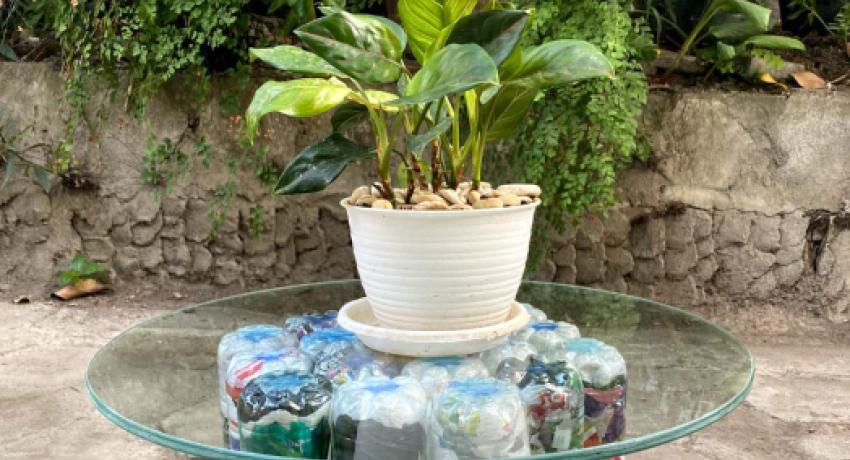Plastic waste is one of the most alarming environmental problems. The amount of plastic waste generated by the community is quite large, so it needs efficient management so as not to cause adverse effects on public health. This problem concerns a group of UNY students who process it into eco-bricks. The eco-brick program is an alternative to plastic waste management. It can be done by collecting plastic waste and then putting it into bottles densely to become eco-bricks that can be used as building materials. They are Muhammad Akhdaan Al Ghozi from Statistics, Ayu Larasati from Mathematics Education, Yufin Briliana from Economics Education, Yusron Ahmad Nur Rifai from Civil Engineering and Yogi Firmansyah from Marketing Management.
According to team leader Muhammad Akhdaan Al Ghozi, waste generated by community activities accumulates and scatters around the village. This problem certainly needs good handling because, if left unchecked, it can cause health problems such as the spread of disease and air pollution. In addition to the accumulation of waste, the village is also faced with environmental problems, waste management and skills in waste management. In terms of waste management, this village is faced with no innovation to process waste better; even the collected waste is disposed of directly without any sorting of waste, and it is not uncommon to throw it away. "Therefore, we will help assist the community, which is expected to be able to improve skills in sorting waste, which can become a sustainable innovation, and the most important thing is increasing public environmental awareness of the importance of maintaining environmental cleanliness and reducing waste," she said on Friday (20/10).
Ayu Larasati added that ecobricking can be a way to build community in society and work together to achieve a common goal. In general, the waste bank and ecobrick programs can help improve waste management in a more efficient, environmentally friendly way and have the potential to increase the creativity skills of local communities and improve the quality of sanitation through ecobrick products as an alternative to bricks in infrastructure development such as buildings, roads, and so on. "The use of eco-bricks can improve the quality of sanitation because the material used is not easily weathered and is resistant to weather and water," Ayu explained. In addition, using eco-bricks can also reduce the amount of waste in the surrounding environment, which can be a source of disease. In this way, every community can exercise their creativity by implementing the ecobrick program.
Yusron Ahmad Nur Rifai explained that their group collaborated with Kledokan villages to process waste into eco-bricks. They started with socialization and formed a waste bank to collect plastic waste for the ecobrick program. The plastic waste collected through the waste bank is processed into eco-bricks. "The tools and materials needed are plastic bottles, plastic waste that has been collected, sticks to compact and paint or pilox," said Yusron. The manufacturing steps are to wash and dry all the bottles and plastic waste, cut them out and put them in the bottle. Use a stick to compact it and then colour the bottle to make it interesting. The last step is to arrange the eco-bricks according to the guidelines. This UNY team made a table and chairs and eco-bricks that they had made.
This work has won funding from the Directorate of Learning and Student Affairs (Belmawa) of the Indonesian Ministry of Education, Culture, Research and Technology in the Student Creativity Program (PKM) in the field of PKM-PM in 2023. Darwis Flamboyan Kledokan Sleman Chairperson Thoharini, S.Pd was happy to work with UNY students to reduce plastic waste in her village by making eco-bricks. "When practising ecobricking at the PAUD, the children were happy putting plastic in the available bottles. Directly, this also trains children's motor skills," she said. Thoharini hopes that this activity is not limited to Kledokan village but can be widespread to save the environment from the increasing number of plastic waste. (Author: Dedy, Editor: Sudaryono, Tj.lak)





